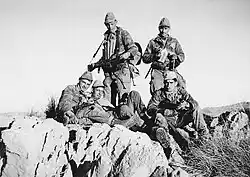
French Algeria refers to the colonization of Algeria in the Maghreb region of North Africa by the French state from the 1830s onwards. The French conquest of Algeria was gradual, with the coastal regions in the north of the vast country seized early on, followed by a much slower war against the Berbers and Arabs of the inland regions south to the Atlas Mountains and Sahara Desert in the decades that followed. French rule was only finally established completely over the country by the end of the nineteenth century. Owing to its proximity to southern France, Algeria became France’s most important overseas colony, with hundreds of thousands of French people acquiring estates here. It became so important to France that it was one of the few parts of its vast colonial empire which it refused to voluntarily grant independence to in the aftermath of the Second World War. Instead the Algerian War of Independence had to be fought between 1954 and 1962 before the French were removed from the country. French involvement in Algeria had a major impact on migratory patterns between France and Algeria over the last two centuries.[1]
Research your ancestors on MyHeritage
French Algeria chronology of eventsFrench Algeria chronology of events
France’s colonial activities in many ways overlapped with those of England/Britain in the early modern era. Both powers settled their first permanent colonies in North America at the beginning of the seventeenth century and expanded their presences there significantly in the century that followed. Both also colonized several Caribbean islands and established important sugar-cane colonies there. Finally, both were active in the east and had acquired footholds on the coast of the subcontinent of India by the early eighteenth century. But where the British Empire would go from strength to strength in the decades thereafter, France’s early colonial endeavors were completely thwarted. They lost their colonies in Canada and had their presence in India undermined in the course of the Seven Years’ War (1756–1763) and then eventually sold the Louisiana colony to the United States in 1803. Thus, when Frenchmen began proposing the conquest of Algeria right across the Mediterranean Sea from southern France in the early nineteenth century many viewed the enterprise as a means of rejuvenating France as a colonial and imperial power.[2]
The French conquest of the North African country, which at the time was ruled as a largely independent state, though one with nominal allegiance to the Ottoman Empire in Constantinople, began with a major invasion in 1830 consisting of an armada of hundreds of ships and tens of thousands of men. With their superior military tactics and weapons, the French quickly overcame the resistance of the local deys and secured control over the coastal cities, towns and ports of the north. However, Algeria is a vast country and is much more difficult to control once one heads south away from the coast into the rugged Atlas Mountains and the Sahara Desert. Guerilla wars would be fought here for decades to come as the French sought to impose their control ever further south towards the desert over local lords who had stepped into the vacuum of authority created here after the invasion of 1830. In the end it would take until 1903 before the French fully pacified the entire country, though this was often more a statement of how little the southern climes of the country were valued than of French inability to secure these parts of Algeria militarily.[3]

For numerous reasons, specifically its proximity to France, the similarity of the climate of the northern parts of Algeria to large parts of southern France, and the possibility of pursuing economic activities like wine-making which were familiar to the French, a great many people left France and settled in Algeria from the 1830s onwards. In North Africa they received favorable grants of land and treatment by the colonial government. Thus, hundreds of thousands of French people, French Jews and other European groups colonized Algeria in the nineteenth century and continued to arrive in large numbers through the first half of the twentieth century. In the process Algeria became an integral part of the French psyche. Other colonies in Africa and Indochina were deemed to be part of France’s empire, but Algeria became almost a part of France itself in the eyes of many French people and was administered as a series of French provinces the same as Brittany, Provence or any other part of France were.[4]
The Algerian people were less sanguine, as their 73-year war of resistance against French expansion between 1830 and 1903 should have indicated. In the aftermath of the Second World War, when it became clear that France had no intention of granting Algeria the independence that so many colonies were now clamoring for in western Africa and Indochina, the National Liberation Front was formed by Algerian revolutionaries. On All Saints’ Day 1954 they initiated a war of independence. The Algerian War would last seven and a half bloody years down to March 1962, leading to war crimes, the deaths of between half a million and a one and a half million people and the destabilization of French politics and society itself. When it ended, the French pulled out of Algeria entirely and the country has since gone through numerous dictatorships and fundamentalist Islamic governments.[5]
Extent to migration to French AlgeriaExtent to migration to French Algeria

Hundreds of thousands of people migrated to Algeria between the inception of French colonial rule in 1830 and the beginning of the Second World War in 1939. Most of these were French people, though some came from other European countries like Spain and Germany. Some were political refugees from Alsace and Lorraine that left those provinces at the end of the Franco-Prussian War in 1871. Tens of thousands were Jewish people from Western Europe who were looking to find a more tolerant environment than Europe was becoming in the late nineteenth and early twentieth centuries. These pied-noirs or ‘black feet’ as they became known numbered over a million people in Algeria when the last census prior to independence was taken in 1960. However, following the establishment of independence in 1962 there was a mass flight of the colonial community back to France, reversing 130 years of colonization.[6] Many pied-noirs were people like the writer, playwright and existentialist philosopher, Albert Camus, who made a substantial impact on French life and society in the twentieth century.[7]
Demographic impact of French colonial activity in AlgeriaDemographic impact of French colonial activity in Algeria

Ironically, the greater long-term impact of French colonial activity in Algeria has actually been felt in France rather than Algeria. This contradicts most colonial experiences, during which the colonized country generally ends up with a colonial population afterwards. This did occur in the short term in Algeria. As seen, a huge French colonial community developed in Algeria between the 1830s and the 1950s, but the Algerian War of Independence and the establishment of an independent Algeria saw the mass exodus of the French population from the country back to France itself.
Conversely, there was no reversal of Algerian migration to France, which had begun in the colonial era and continued into the post-colonial period from the mid-1960s onwards. Hundreds of thousands of people of Berber or Arab descent had made France their home prior to 1960 and many more have since, with over half a million people in France today being of Algerian birth. Many well-known French people today are of Algerian ethnicity, notably the French footballers, Kylian Mbappé, Zinedine Zidane and Karim Benzema, and the actors and actresses, Tahar Rahim, Sofia Boutella and Leila Bekhti. Hence, French colonial activity in Algeria has had substantial impacts on genealogy and family history in both France and Algeria.[8]
See alsoSee also
Explore more about French AlgeriaExplore more about French Algeria
- France, Vital Records Index records collection on MyHeritage
- France Newspapers & Periodicals records collection on MyHeritage
- France Deaths records collection on MyHeritage
- France, Naturalizations records collections on MyHeritage
References
- ↑ Sung Choi, French Algeria, 1830–1962 (London, 2016).
- ↑ Laurent Dubois, ‘The End of the Ancien Régime French Empire’, in Charles Forsdick and David Murphy (eds), Postcolonial thought in the French-speaking world (Oxford, 2009).
- ↑ https://www.historytoday.com/archive/conquest-algiers
- ↑ Paige N. Gulley, ‘French Land, Algerian People: Nineteenth-Century French Discourse on Algeria and Its Consequences’, in Voces Novae, Vol. 10 (2018), pp. 1–35.
- ↑ https://jacobin.com/2021/04/algerian-revolution-france-colonialism
- ↑ http://refugeehistory.org/blog/2019/9/17/victims-of-decolonisation-the-french-settlers-of-algeria
- ↑ https://plato.stanford.edu/entries/camus/
- ↑ https://www.histoire-immigration.fr/en/migration-characteristics-by-country-of-origin/algerian-immigration-into-france

